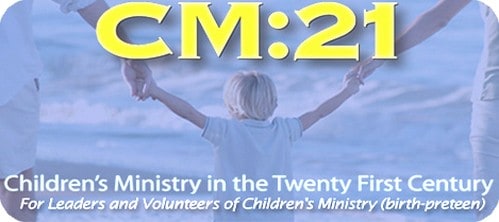
Recently, my church hosted a conference which was open to our children’s ministry volunteers, as well as other local churches in the area. The conference was intended to not only encourage volunteers, but to train them as well. The Friday night through Saturday morning trainings focused on material entitled, CM:21, Children’s Ministry in the Twenty First Century.
CM:21 was lead by Art Murphy, President of Arrow Ministries. It is evident that Art has a passion for children’s ministry and for investing in volunteers. His enthusiasm and dedication for effectively teaching children was contagious during the weekend. It’s impossible to cover all the material he discussed, but I wanted to highlight some of the main points I found to be encouraging and challenging.
On Friday night, he discussed subjects such as what characterizes a healthy church, myths that can surround children’s ministry, as well as ways to strengthen your preschool and children’s ministries. One of the most interesting things he pointed out was the list of myths about children’s ministry. His material states:
Biggest Myths About Children’s Ministry
- Leading a child to pray the ‘sinner’s prayer’ means he/she is a Christian.
- Leading a child to be baptized means he/she is a Christian.
- Knowledge is the same as wisdom.
- Lecture is the best teaching tool.
- Using religious language will lead children to Christ.
- Fun is a bad word.
- Entertaining children is the new goal.
- All children are the same.
- Being busy means being effective.
- No one wants to volunteer in children’s ministry.
In that list are some nuggets of truth that every children’s director and volunteer needs to be reminded of on a daily basis. Reading through that list reminded me that I must be focused on presenting my children with a clear picture of the Gospel, and not just present it as repeating a prayer and viola, you’re saved! He also emphasized that children need to have fun and enjoy their time at Church. That is refreshing to hear!
Becoming a Child-Friendly Church
On Saturday morning, Art began the session having the attendees discuss what Disney World and McDonalds do and how they manage to attract so many children. Art made an important observation about Disney when he said, “Their goal is to exceed expectations.” He went on to explain that Disney creates an atmosphere of wanting to be the best and sets expectations.
With McDonalds, they created the “happy meal” and added playgrounds to their restaurants. These two businesses know how to attract children and exceed in their business fields. Art went on to explain, “If you’re wanting to grow your ministry, you have to put the ‘happy’ and play back in it—those are love languages to children.”
He discussed Matthew 13, the Parable of the Sower, and how children’s ministry focuses on creating fertile soil. In directing our ministry, it is vital that we make it appealing to children and understand the balance between fun and learning about God. Art suggested that if you have a game that you play at the beginning of Sunday School, to then tie it into the lesson—That way you are connecting their fun with the lesson. He also highlighted that application is so important in teaching children. It is vital for us to connect the Bible story to their lives and how they can apply it on a daily basis. He had us fill in the blanks to the following statements:
What We Want Every Child to Think During the Week
- “What would God want me to do in this situation?”
- “I cannot wait until next Sunday.”
That last thing I want to touch on is his method on enlisting volunteers. Art mentioned several key points in helping to find volunteers to serve in children’s ministry. Some of his suggestions are to get the support of the pastor in recruiting volunteers, current volunteers enlist one new person yearly, use room parents to help, provide training for your volunteers, and to personally ask people to serve.
A main point he drove home in the recruiting process is to pray for volunteers. Art suggested praying a prayer similar to this, “Lord, for those who you are calling to say yes…” We don’t want just anybody serving in our children’s department if they don’t feel called—We should desire the right individual for the right calling.
